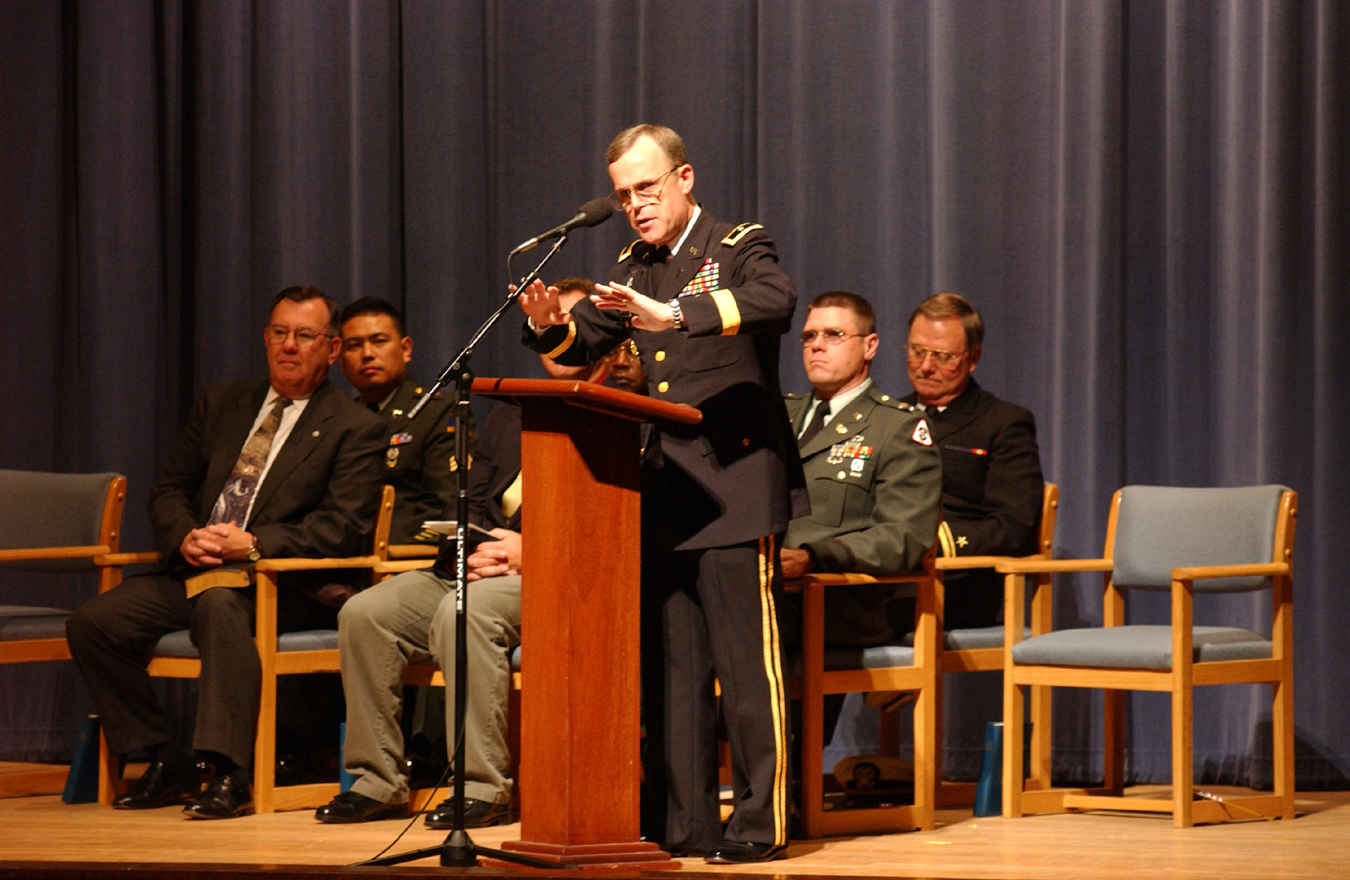
FORT WORTH, Texas (BP)–During an emotional speech, a Southwestern Baptist Theological Seminary church history professor and retired brigadier general from the U.S. Army said the common denominator of those who died at the Pentagon Sept. 11 was, “They were all great Americans.”
James Spivey, the former assistant chief of chaplains in the U.S. Army, returned to the seminary to a warm welcome to give the Veterans Day chapel address at Southwestern Seminary Nov. 8. Spivey had been at the Pentagon since being called to active duty Sept. 15 to develop a family support center for the victims of the Pentagon attack.
The loss of life at one of the pillars of this nation’s defense was great, as 124 people died in the initial attack with another dying at a hospital a short time later. “What was the common thread that ran through all of them?” Spivey asked. “They were all great Americans. They were all there defending this country. That was their commitment, to defend not only the Constitution of the United States, but the country for which it stands.”
Spivey thanked the students and faculty for their prayers and support during his absence and then detailed the events that transpired at ground zero at the Pentagon.
“Crashing into the limestone brick and concrete walls of that five-ring building,” Spivey stated, “[the plane] penetrated all the way to the ‘C’ ring. It collapsed the five stories in an area of about 75 feet.”
He then told how emergency crews came to rescue and to recover, but “unfortunately it was mostly a recovery operation,” he said, as the few who survived were able to walk out on their own.
In the six weeks Spivey served at the Pentagon, he and the Pentagon Family Assistance Center ministered to 184 families. Of those who died, all the passengers on the plane and all but six of those who died in the Pentagon have been identified, Spivey said. “But who were these people?” he asked. A face without a name is almost useless, he said, and a name without a history is almost the same. As the days of helping the families of the victims went by, Spivey began discovering who some of these faceless people were. Some had made plans for what to do in case of a terrorist attack.
One family’s dreams evaporated Sept. 11, Spivey recounted, as the husband never again would hear his wife’s voice. Some of the faceless people were new to the Pentagon or had recently been transferred into the area struck by the jetliner. One man, a Navy civilian video technician, was known throughout the halls as the “Candy Man” and was said to always have a smile for everyone.
Each name and each face were connected to someone, and each face and name had a life still to be lived. To Spivey, however, the attack’s greatest devastation was the effect it had on children. Choking back tears, Spivey told of a mother who informed her two young children that their daddy would not be coming home again because he had been killed at the Pentagon. The children broke out into hysterics and began weeping with anguish, Spivey said. A short time later one of the children asked the mother, “Mom, what will we do for the family picture at Christmas this year? Mom, are you going to have to go to work?”
These are the lives connected to the faces of the heroes of Sept. 11, Spivey said. Of the 125 people who died, 55 were soldiers or sailors and 71 were civilians who were “just as equally serving their country even though they were not in a military uniform,” he said. Some were of different races and ethnicities and some were from different countries, yet all called this country theirs and faithfully served her.
Most of those who died were Christians from different backgrounds, he said. Forty were Roman Catholics, 30 were Baptist, 40 others were of Protestant denominations and one was Buddhist.
Spivey told the chapel audience that the military has been preparing for this type of attack for 10 years. Yet the question still remains, why did this happen?
Spivey said the terrorist attack could happen for the same reason Pearl Harbor could be attacked — simply put, “We were caught unaware.
“We may not have been as ready as we could have been, but I guarantee you we will be ready in the future,” Spivey said. “It will not happen again. Yes, there will be something on the horizon, and I guarantee you, your defense forces will be ready.”
Spivey concluded by reminding students of their calling to the ministry and the need to be ready to present the gospel.
“There is a thirst for spiritual things. The opportunity for you and me to share the gospel is prime,” Spivey said. All Christians must be willing to pay the price and be self-sacrificing and not self-indulgent, he added. “Stop saying someday. Stop saying sooner or later. Someday needs to be now. We don’t have time to prepare to die. Now is the accepted time.”
–30–
(BP) photo posted in the BP Photo Library at http://www.bpnews.net. Photo title: HOME FROM THE PENTAGON.

















